Oscar Pistorius is more than just a name; he's a symbol of triumph, tragedy, and transformation. Once hailed as the "Blade Runner," this South African athlete became an international sensation for his groundbreaking achievements in sports. But beneath the glory lies a complex story that has captured global attention. Let's dive into the life of a man whose journey is as inspiring as it is controversial.
Oscar Pistorius isn't your average athlete. His story is one of resilience, defying the odds, and breaking barriers. From his early days as a double amputee to becoming an Olympic contender, Pistorius has redefined what it means to overcome adversity. Yet, his life took a dramatic turn, leaving the world questioning the fine line between heroism and humanity.
In this article, we'll explore the highs and lows of Oscar Pistorius' life, from his remarkable athletic career to the legal battles that overshadowed his legacy. Whether you're a sports enthusiast or simply curious about the complexities of human nature, this story will leave you reflecting on the duality of fame and fallibility.
Read also:Rose Maries Remarkable Journey Through Showbiz And Life
Table of Contents
- Biography
- Early Life and Background
- Athletic Career: The Blade Runner
- Controversy and Legal Battles
- Public Perception: Hero or Villain?
- Redemption and Second Chances
- Legacy: What Does the Future Hold?
- Impact on Sports and Disability Rights
- Lessons from Oscar's Journey
- Conclusion
Biography
Oscar Pistorius: A Quick Overview
Oscar Pistorius was born on November 22, 1986, in Sandton, Johannesburg, South Africa. Known for his incredible speed and determination, he quickly rose to fame as a Paralympic and Olympic athlete. But before diving into his achievements, let's take a closer look at the man behind the headlines.
| Full Name | Oscar Leonard Carl Pistorius |
|---|---|
| Date of Birth | November 22, 1986 |
| Place of Birth | Sandton, Johannesburg, South Africa |
| Occupation | Athlete, Model, Public Speaker |
| Claim to Fame | First double amputee to compete in the Olympics |
From a young age, Pistorius faced challenges that most of us can't even imagine. Yet, his story is a testament to the power of perseverance and the human spirit.
Early Life and Background
Growing Up as an Amputee
Oscar Pistorius' journey began with a medical challenge. At just 11 months old, he underwent a bilateral amputation below the knee due to a congenital condition. But instead of letting this setback define him, he embraced it as a part of who he was. Growing up in a supportive family, Oscar learned to adapt and thrive.
His parents, Henke and Sheila Pistorius, played a crucial role in shaping his mindset. They encouraged him to participate in sports and activities alongside able-bodied children, instilling in him a sense of confidence and resilience. This early exposure to competitive environments laid the foundation for his future success.
Athletic Career: The Blade Runner
By the time Oscar reached his teenage years, he was already making waves in the world of sports. He started as a rugby player but switched to track and field after injuring his knee. It was during this time that he discovered his true passion – running.
Equipped with state-of-the-art prosthetic legs, Oscar became known as the "Blade Runner." His groundbreaking performance in the 2004 Paralympics in Athens marked the beginning of an extraordinary career. Over the years, he shattered records and broke barriers, earning him a place among the world's elite athletes.
Read also:Mina Starsiak Hawks Vacation Chaos A Candid Look At Family And Career
- 2004: Won gold in the 100m, 200m, and 400m at the Paralympics
- 2011: Became the first double amputee to compete in the IAAF World Championships
- 2012: Made history by competing in both the Olympics and Paralympics
His achievements not only inspired millions but also sparked debates about the role of technology in sports. Was he at an unfair advantage? Or was he simply pushing the boundaries of what was possible? These questions continue to fuel discussions in the sporting world.
Controversy and Legal Battles
The Dark Side of Fame
No one could have predicted the dramatic turn Oscar's life would take in 2013. On February 14th, Valentine's Day, tragedy struck when he shot and killed his girlfriend, Reeva Steenkamp, at his home in Pretoria. The incident sent shockwaves around the world and thrust Pistorius into the spotlight for all the wrong reasons.
The trial that followed was one of the most high-profile cases in recent history. As evidence unfolded, the public was left divided. Was it a case of mistaken identity, or was it a premeditated act of violence? The court ultimately found him guilty of culpable homicide, later upgrading the verdict to murder on appeal.
This chapter in Oscar's life remains a painful reminder of how quickly success can turn into devastation. It also raises important questions about the justice system and the media's role in shaping public opinion.
Public Perception: Hero or Villain?
Public opinion on Oscar Pistorius is as polarized as it gets. Some view him as a victim of circumstances, while others see him as a perpetrator who must face the consequences of his actions. Social media platforms buzzed with debates, hashtags, and petitions, reflecting the intensity of emotions surrounding his case.
Despite the controversy, there are those who believe in his ability to change and grow. Redemption stories often resonate with people, offering a glimmer of hope that even the darkest moments can lead to transformation.
Redemption and Second Chances
A New Beginning
After serving a significant portion of his sentence, Oscar was released on house arrest in 2015. Since then, he has focused on rebuilding his life and giving back to the community. He has spoken openly about his struggles and the lessons he's learned, using his platform to advocate for mental health awareness and disability rights.
His efforts have not gone unnoticed. Many organizations have welcomed him as a speaker, highlighting the importance of second chances and personal growth. While the road to redemption is long and challenging, Oscar's story serves as a powerful reminder that change is possible.
Legacy: What Does the Future Hold?
Oscar Pistorius' legacy is complex, to say the least. On one hand, he revolutionized the world of sports by proving that physical limitations don't have to define one's potential. On the other hand, his legal troubles have cast a shadow over his achievements.
As he continues to navigate the complexities of life post-prison, the world watches with a mix of curiosity and skepticism. Will he be able to reclaim the title of a hero? Only time will tell.
Impact on Sports and Disability Rights
Breaking Barriers for All
Regardless of the controversies, Oscar's impact on the sports world cannot be denied. He paved the way for athletes with disabilities to compete on an equal playing field. His determination and courage inspired countless individuals to pursue their dreams, regardless of the obstacles they face.
Moreover, his story has sparked conversations about accessibility, inclusion, and the importance of embracing diversity in all its forms. These discussions are crucial in creating a more equitable society where everyone has the opportunity to shine.
Lessons from Oscar's Journey
Oscar Pistorius' life is a powerful reminder of the highs and lows that come with fame and fortune. Here are a few key takeaways:
- Success doesn't define who you are; it's how you handle challenges that truly matters.
- Second chances are invaluable opportunities for growth and transformation.
- Perception can shape reality, but the truth often lies somewhere in between.
- Empathy and understanding are essential in navigating the complexities of human nature.
As we reflect on Oscar's journey, we're reminded that life is full of unexpected twists and turns. How we respond to them defines our character and legacy.
Conclusion
Oscar Pistorius' story is one of triumph, tragedy, and transformation. From his early days as a double amputee to his rise as an Olympic contender, he has defied the odds and inspired millions. However, his fall from grace serves as a cautionary tale about the fragility of fame and the importance of accountability.
As we conclude this article, we invite you to share your thoughts and reflections in the comments below. What lessons have you learned from Oscar's journey? How do you think society can better support individuals who have made mistakes but seek redemption?
And if you enjoyed this article, don't forget to share it with your friends and family. Together, let's continue the conversation about the complexities of human nature and the power of second chances.


